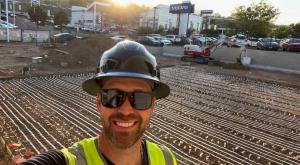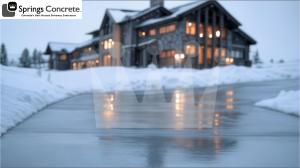Retailers Embrace Heated Concrete for Safer Access, Lower Risk, and Sustainability Gains
Cold Truth, Warm Results: Heated Infrastructure is Quietly Reshaping the Retail Experience in Colorado
The shift is most visible after major snow events, when certain properties remain dry and accessible while others struggle with ice buildup, plow delays, and chemical damage. This emerging contrast is a result of radiant snowmelt systems—permanently installed beneath driveways, walkways, and entrance zones—that activate in response to snow and freezing conditions.
Springs Concrete, LLC, a Colorado-based leader in heated concrete technology, reports a notable increase in inquiries and installations in recent years. The company designs and installs both electric and hydronic systems for residential and commercial projects across the state, with a growing focus on high-traffic commercial zones.
According to Daniel Flansburg, founder of Springs Concrete, the benefits of these systems go beyond surface-level convenience.
“The continuity of a heated concrete system consistently outperforms manual snow removal by delivering uniform, automatic snow and ice melt without interruption,” said Flansburg. “For many properties, that translates into a safer experience, less liability exposure, and a noticeable reduction in winter maintenance stress.”
The systems are particularly effective in critical zones where accessibility and safety are non-negotiable. These include:
• Storefront entrances
• ADA parking stalls
• Pedestrian walkways
• Cart return lanes
• Order pickup areas
• Emergency access zones
• Multifamily housing entries
In these areas, even minor delays in snow removal can result in slip-and-fall injuries, damaged surfaces, or access issues for vulnerable populations. By contrast, heated concrete systems maintain clear conditions from the first flake to the final melt.
In addition to safety, many property owners are drawn to the predictability of automated snowmelt systems. Because they activate based on real-time weather conditions, they eliminate the uncertainty of relying on third-party plow schedules or chemical applications. This allows building and facility managers to reallocate staff resources during storms and reduce emergency vendor calls.
Cost considerations are also shifting. While the upfront investment in heated concrete is higher than seasonal snow removal contracts, many clients are reporting cost neutrality or savings over time when factoring in long-term damage repair, reduced insurance claims, and improved operational flow.
Springs Concrete also notes that sustainability is becoming a key driver of adoption. Many organizations now integrate the systems with solar offset programs, renewable energy credits, or direct partnerships with community solar farms. This allows companies to maintain ESG compliance while improving site safety.
Flansburg emphasized that the technology aligns with Colorado’s demanding climate and growing commitment to infrastructure resilience.
“This isn’t just a convenience product. It’s a real infrastructure upgrade,” he said. “Retailers, schools, cities—they’re starting to see snowmelt as a base-layer asset, like lighting or drainage. And the results speak for themselves.”
Among the most commonly reported benefits from commercial property managers:
1. Fewer Slip-and-Fall Incidents – A measurable reduction in reported injuries, especially near entrances and accessible parking zones.
2. Predictable Performance – Weather-based automation ensures consistent activation and reliable melt patterns.
3. Operational Efficiency – Less last-minute coordination with plow services or maintenance staff.
4. Long-Term Cost Control – Lower spending over time on seasonal snow removal, chemical agents, and interior floor maintenance.
5. Customer and Employee Satisfaction – Fewer complaints, easier access, and improved trust in site safety.
6. Environmental Compliance – Easier alignment with ESG targets via green energy offsets.
7. Reduced Property Damage – Less wear on concrete, flooring, and landscaping from chemical deicers and snow equipment.
Springs Concrete continues to lead the state in heated concrete innovation, offering tailored system designs for residential driveways, commercial properties, and municipal sites. With installations at various altitudes and exposure levels, the company has become a trusted source for clients seeking performance, durability, and design excellence in extreme weather environments.
Daniel Flansburg
Springs Concrete, LLC
+1 719-323-5024
email us here
Visit us on social media:
LinkedIn
Instagram
Facebook
YouTube
Legal Disclaimer:
EIN Presswire provides this news content "as is" without warranty of any kind. We do not accept any responsibility or liability for the accuracy, content, images, videos, licenses, completeness, legality, or reliability of the information contained in this article. If you have any complaints or copyright issues related to this article, kindly contact the author above.
DME Service Solutions Achieves ISO/IEC 27001:2022 Certification, Strengthening Commitment to Data Security
Formalin Market Rising Business Opportunities with Prominent Investment Ratio by 2030 | AMR
$5.8 + Billion Natural Food Colors Market to Grow at 8.7% CAGR by 2035
Więcej ważnych informacji
 Jedynka Newserii
Jedynka Newserii

 Jedynka Newserii
Jedynka Newserii

Polityka

Firmy dzierżawiące grunty od Skarbu Państwa muszą zwrócić majątek rolny. Zagrożony jest też wspierany przez nich ośrodek rehabilitacyjny
Działalność ośrodka rehabilitacji dla dzieci z niepełnosprawnościami w Głubczycach, w województwie opolskim, jest zagrożona, o czym alarmuje Stowarzyszenie „Tacy Sami”. Zagrożenie jest konsekwencją restrukturyzacji spółki Top Farms Głubczyce, która jest jednym z największych pracodawców w okolicy i od lat wspiera działalność stowarzyszenia. Rolnicza spółka nie wie, jakie będą dalsze losy dzierżawionych do tej pory przez nią ziem, które w listopadzie br. muszą wrócić do Zasobu Skarbu Państwa. Zarząd spółki od wielu miesięcy apeluje do Krajowego Ośrodka Wsparcia Rolnictwa o wiążące decyzje w sprawie powołania Ośrodków Produkcji Rolniczej, które miałyby powstać na zwróconych gruntach, oraz kryteriów wyboru ich nowych dzierżawców.
Bankowość
Polskie kredyty hipoteczne wciąż jednymi z najdroższych w Europie. Zdaniem członka RPP odgórne ograniczanie marż banków się nie sprawdzi

Hipoteki w Polsce, co podkreśla też wielu polityków, należą do najdroższych w Europie. To nie tylko kwestia wysokości stóp procentowych, ale też marży banku. Zdaniem członka RPP prof. Ireneusza Dąbrowskiego jest tylko możliwość wpływania na ten pierwszy czynnik, bo regulacyjne ograniczenie wysokości marży byłoby trudne do wdrożenia.
Ochrona środowiska
Budowa morskich farm wiatrowych w Polsce szansą na kilkadziesiąt tysięcy nowych miejsc pracy. Wciąż brakuje jednak wykwalifikowanych pracowników

W Krajowym Planie w dziedzinie Energii i Klimatu rząd przewiduje zainstalowanie do 2030 roku około 5,9 GW w morskich farmach wiatrowych i kolejnych 12 GW w ciągu następnej dekady. Offshore ma być istotnym filarem dekarbonizacji krajowej gospodarki. Realizowane przez polskie spółki wraz z partnerami zagranicznymi projekty tzw. fazy I nabierają tempa i wkraczają w etap budowy infrastruktury na lądzie. Wśród wyzwań, które czekają wykonawców, jest m.in. brak pracowników z branży offshore. Pomocne może być ściąganie do kraju Polaków, którzy pracują na zagranicznych projektach morskich.
Partner serwisu
Szkolenia

Akademia Newserii
Akademia Newserii to projekt, w ramach którego najlepsi polscy dziennikarze biznesowi, giełdowi oraz lifestylowi, a także szkoleniowcy z wieloletnim doświadczeniem dzielą się swoją wiedzą nt. pracy z mediami.



![Nestlé w Polsce podsumowuje wpływ na krajową gospodarkę. Firma wygenerowała 0,6 proc. polskiego PKB [DEPESZA]](https://www.newseria.pl/files/1097841585/fabryka-nesquik_1,w_85,r_png,_small.png)






.gif)

 |
| |
| |
|